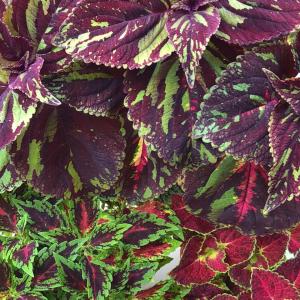Plant Experience
Detail
Coleus plants with their bright colors, a wide variety of foliage colors, leaf shapes and forms are easy to grow and durable.
Many grow coleus as an annual bedding plant, planted in pots or garden beds for creating dramatic, colorful borders in full sun, bright light and some in partial shade.
Most gardeners pinch off the non-spectacular flower spikes to help keep plants bushy and vigorous. The flowering cycle takes lots of plant energy away from the plant.
Coleus plants come in a wide range cultivars, colorful foliage combinations and leaf patterns. Some are green marked with ivory, ochre, apricot, brown, pink, red, or purple. A few are of solid color; most have two-tone borders or speckles.
Pinch To Control Size and Fullness
If you don’t want coleus to grow tall, you can control its size by pruning. Take coleus leaf tips off the main stems and the plant will branch out.
New leaves and then branches will form from the bud above almost every leaf.
The more tips you pinch off, the more branches there will be, although the leaves will be smaller than on a plant with fewer branches.
Remove the inner branches and the leaves will grow larger. Remove the lower branches to create a plant shaped like a tree.
You can multiply your plants as much as you want. Color and leaf patterns of plants started from cuttings will be the same as that of the original plant.
The 2 to 4-inch tips you prune off can be used to start new plants.
Nip off the lower leaves of these cuttings and cut the base of the stem with a clean slant.
Set the cutting at least an inch deep in a growing medium like soil, sand, peatmoss, vermiculite, or even water.
Keep the medium moist (or the water fresh) but add no fertilizer. Roots will begin to develop in a few days. In summer, these cuttings can be rooted right in a shaded garden bed.
After two or three weeks, take hold of a cutting and pull it upward gently. If it resists your pull, the young plant has a good root system and ready for transplanting.
Plant Care
Grow coleus in the sun or shade, depending on your climate. If you live in a cool, humid area, full sun will bring out the best foliage color and the sturdiest plants.
If you are in a hot, dry region, partial shade is preferable.
Coleus grows best at temperatures above 70 degrees. Plants should have lots of water, so they need well-drained soil, not one where their roots stand in soggy soil.
Even though plants will grow well in water alone, soil that is always wet is quite another thing, and in this case, the roots will rot.
In pots or other containers, provide a well-drained soil and give enough water to keep the soil a bit damp. In containers without drainage holes, let the surface soil dry out a little just before watering.
Outdoors, water coleus about as often as you water garden annuals. The condition of the coleus leaves is a good soil-moisture indicator.
Leaves of dry plants droop. Leaves of plants that are too wet turn yellow.
Feed Coleus Well
Fertilizer is necessary for vigorous growth. Either cow manure, a chemical fertilizer high in nitrogen or liquid water-soluble fertilizer (which they love) is satisfactory.
Follow the manufacturer’s directions for feeding annuals or houseplants. If you want to keep the plants small, pinch the tips and give them a little fertilizer.
Pest and Disease On Coleus
Mealybug sometimes makes its home on this succulent plant indoors. but a regular shower of cold water usually keeps mealybug insects away.
A bit of cotton on a matchstick dipped in alcohol will kill those pests who do appear.
Take it easy when applying sprays during the heat of the day. Always follow the label of the applied product.
During hot, dry months, spider mite colonies can become a problem. Because coleus grows so well, sometimes the easiest control is to cut the plants down, throw away all debris and apply an insecticidal soap.
Many grow coleus as an annual bedding plant, planted in pots or garden beds for creating dramatic, colorful borders in full sun, bright light and some in partial shade.
Most gardeners pinch off the non-spectacular flower spikes to help keep plants bushy and vigorous. The flowering cycle takes lots of plant energy away from the plant.
Coleus plants come in a wide range cultivars, colorful foliage combinations and leaf patterns. Some are green marked with ivory, ochre, apricot, brown, pink, red, or purple. A few are of solid color; most have two-tone borders or speckles.
Pinch To Control Size and Fullness
If you don’t want coleus to grow tall, you can control its size by pruning. Take coleus leaf tips off the main stems and the plant will branch out.
New leaves and then branches will form from the bud above almost every leaf.
The more tips you pinch off, the more branches there will be, although the leaves will be smaller than on a plant with fewer branches.
Remove the inner branches and the leaves will grow larger. Remove the lower branches to create a plant shaped like a tree.
You can multiply your plants as much as you want. Color and leaf patterns of plants started from cuttings will be the same as that of the original plant.
The 2 to 4-inch tips you prune off can be used to start new plants.
Nip off the lower leaves of these cuttings and cut the base of the stem with a clean slant.
Set the cutting at least an inch deep in a growing medium like soil, sand, peatmoss, vermiculite, or even water.
Keep the medium moist (or the water fresh) but add no fertilizer. Roots will begin to develop in a few days. In summer, these cuttings can be rooted right in a shaded garden bed.
After two or three weeks, take hold of a cutting and pull it upward gently. If it resists your pull, the young plant has a good root system and ready for transplanting.
Plant Care
Grow coleus in the sun or shade, depending on your climate. If you live in a cool, humid area, full sun will bring out the best foliage color and the sturdiest plants.
If you are in a hot, dry region, partial shade is preferable.
Coleus grows best at temperatures above 70 degrees. Plants should have lots of water, so they need well-drained soil, not one where their roots stand in soggy soil.
Even though plants will grow well in water alone, soil that is always wet is quite another thing, and in this case, the roots will rot.
In pots or other containers, provide a well-drained soil and give enough water to keep the soil a bit damp. In containers without drainage holes, let the surface soil dry out a little just before watering.
Outdoors, water coleus about as often as you water garden annuals. The condition of the coleus leaves is a good soil-moisture indicator.
Leaves of dry plants droop. Leaves of plants that are too wet turn yellow.
Feed Coleus Well
Fertilizer is necessary for vigorous growth. Either cow manure, a chemical fertilizer high in nitrogen or liquid water-soluble fertilizer (which they love) is satisfactory.
Follow the manufacturer’s directions for feeding annuals or houseplants. If you want to keep the plants small, pinch the tips and give them a little fertilizer.
Pest and Disease On Coleus
Mealybug sometimes makes its home on this succulent plant indoors. but a regular shower of cold water usually keeps mealybug insects away.
A bit of cotton on a matchstick dipped in alcohol will kill those pests who do appear.
Take it easy when applying sprays during the heat of the day. Always follow the label of the applied product.
During hot, dry months, spider mite colonies can become a problem. Because coleus grows so well, sometimes the easiest control is to cut the plants down, throw away all debris and apply an insecticidal soap.
Album (22)
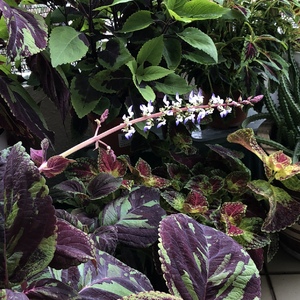

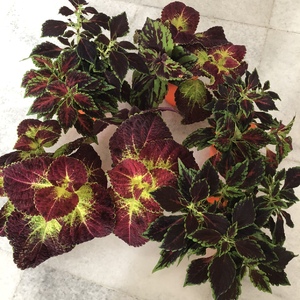

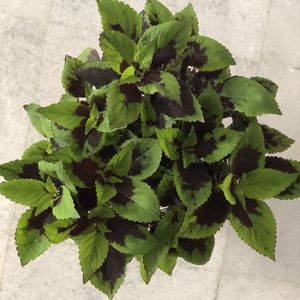

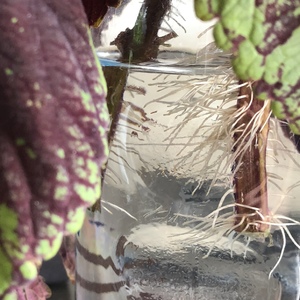

kensong
2018-07-10

I usually pinch of Coleus flowers but seemed to have missed this one. Pretty too.


kensong
2018-06-22

Lots of Coleus cuttings so looks like I'm going to need more pots soon.




kensong
2018-06-17

Addition to my Coleus collection.




kensong
2018-06-10

From one pot it's now four after potting the rooted cuttings. Im wondering why The mother plant is sprouting new leaves with different colours. More reds.


kensong
2018-06-07

My Coleus rooted! I did use rooting hormone so I'm wondering if that speeded it up.


kensong
2018-06-05

My Coleus cuttings flowered. I am still waiting for it to root but it flowered instead. Should I just pinch it off?
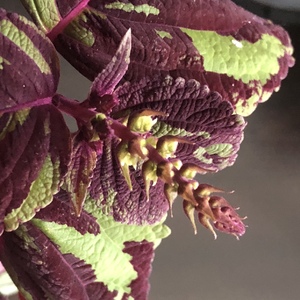



kensong
2018-06-03

Something ate my Coleus leaves last week. It's just once and has not happened since. Any idea what is it that did this? Cutter bees?
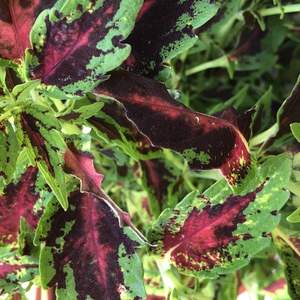

kensong
2018-05-30

Stem propogation of my Coleus which has grown too tall. Hopefully I'll have four new plants.
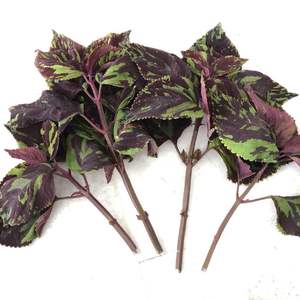
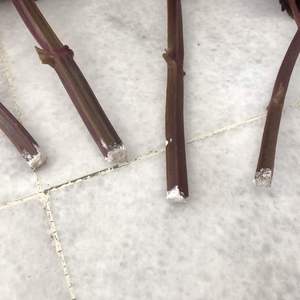
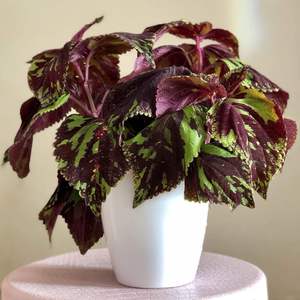



kensong
2018-05-25

Is something eating my coleus? I see some leaves being eaten away and I find these droppings under the plant each morning. I inspected but can't find anything.

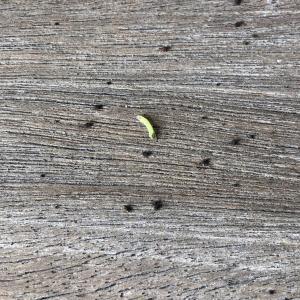


kensong
2018-05-19

This is my first growing diary.
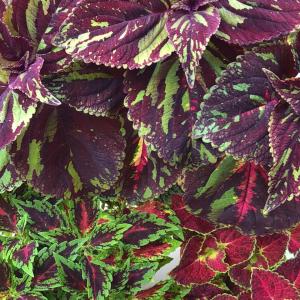

Elite Article


